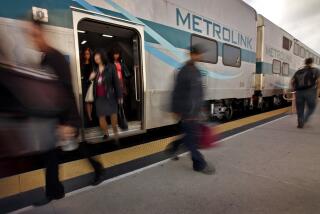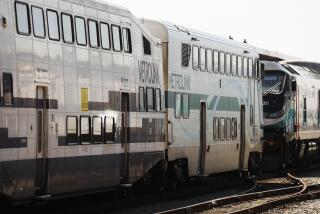Metrolink officials say trains crashed after their engineer drove through red light
Metrolink officials said Saturday that a train engineer’s failure to heed a red light signal apparently caused the catastrophic head-on crash in Chatsworth on Friday afternoon that claimed at least 25 lives.
As rescuers continued the emotionally grueling work of extracting bodies from a tangled mountain of steel and dozens of families maintained vigils for the injured in hospital waiting rooms, Metrolink officials accepted responsibility for the worst Southern California train wreck in more than 50 years.
FOR THE RECORD:
Train crash: A report in Sunday’s Section A about an engineer involved in the Chatsworth Metrolink crash said the United Transportation Union did not represent Metrolink employees. The union represents its conductors, according to union spokesman Frank N. Wilner. Also, the article said Metrolink’s dispatch center is in Pacoima; it’s in Pomona. —
“We want to be honest in our appraisal,” Metrolink spokeswoman Denise Tyrrell somberly told reporters at the scene.
The unusually swift announcement came as the National Transportation Safety Board and other agencies were still gearing up their investigations. Saturday afternoon, the NTSB said it was reserving judgment on the cause of the collision, and a union representing 125,000 rail workers -- though not those who work for Metrolink -- called the assignment of blame “terribly premature.”
“The signals might not have been working” properly, said Frank N. Wilner of the United Transportation Union, noting that officials had not yet examined the “black box” and other crash-site evidence. “We don’t know if there was glare, or if he succumbed to a heart attack or a stroke.”
The engineer, who died in the crash, had at least 10 years of experience working for Amtrak and more recently a private firm, Veolia Transportation, which has contracted with Metrolink to provide engineers since 2005, officials said. The Simi Valley-bound Metrolink train he drove Friday was carrying 225 passengers when it collided with a Union Pacific freight train descending into the San Fernando Valley.
“That is what has caused so much pain,” Tyrrell said. “It is your worst fear that this could happen, that the ability for human error to occur could come into the scenario.”
Friday’s crash boosted Metrolink’s fatality record to one of the worst in the nation, records show.
Beyond the death toll, which continued climbing Saturday, 135 passengers were injured, 40 of them critically, when the freight train’s locomotive slammed into the Metrolink engine, driving it back inside the shell of the first seating car.
The process of identifying those killed and notifying relatives continued through the day, according to the Los Angeles County coroner’s office. By Saturday night, the names of 21 people killed in the crash had been released. And across the county, friends and relatives of the injured waited for news.
Alan Buckley’s wife and grown children spent hours searching for him Friday night. They knew the 59-year-old mechanic took the train every afternoon from his job in Burbank to his home in Simi Valley. When they didn’t find him at the crash site, they called area hospitals. After eight hours, the exhausted family gave up for the night.
But Buckley’s daughter-in-law was restless. She drove to the crash site at 4 a.m. and finally managed to talk to officials at the makeshift mortuary.
They confirmed the family’s worst fear: Buckley was dead.
Oaks Christian School English teacher Paul Long, 54, died Saturday afternoon at Los Angeles County-USC Medical Center soon after being taken off life support. His wife, Karen, and his son, Devin, who were both injured during the crash, were at the hospital with him. The family had been taking the train home to Moorpark after attending the funeral for Long’s mother in South Carolina.
As word spread of Long’s condition, friends, relatives, students and teachers prayed for him -- at the hospital, in homes throughout Moorpark and even on the football field where the high school team was playing.
“We believe in the power of prayer,” said Jim Lee, the high school chaplain. “We believe that every prayer is answered. It just might not be answered the way we want.”
The family of Donna Lynn Remata, 49, who also died in the crash, mourned her Saturday. “My mom was awesome,” said her daughter Tiffany “Koga” Remata, 17. “I have no words. I can’t describe her.” Her mother, who worked for the Metropolitan Transportation Authority, had many friends, but Koga said she was still amazed by the calls that poured in to the family’s Simi Valley home Saturday expressing condolences. “I was like, ‘Wow, Mom. Nice.’ ”
At Ronald Reagan UCLA Medical Center, where eight of the injured were being treated, about 40 friends and relatives gathered in a special waiting room. Dr. Henry Gill Cryer, chief of trauma surgery, said hospital staff had provided pizza for relatives awaiting medical updates.
As the aftermath continued to play out, the most pressing question was how the Metrolink engineer could have missed the red signal.
KCBS-AM (740) reported Saturday that several teenage train aficionados said they had received a text message from the engineer shortly before the crash. The NTSB said it was treating the report with caution, noting that similar accounts had circulated after a crash in Boston but were found to be inaccurate.
“We’ve heard reports to that effect, but we have nothing to confirm,” said NTSB board member Kitty Higgins.
The engineer was certified specifically on the L.A.-to-Simi Valley route, his regular assignment, and was familiar with signal locations, officials said.
The Union Pacific freight train and the 3:35 p.m. Metrolink train out of Union Station routinely passed each other near Chatsworth.
“That is a daily freight train. It’s a regular traveler on those tracks,” said Francisco Oaxaca, a Metrolink spokesman. He said the spot where the two trains pass can vary, depending on whether the freight train is running early or late.
“It was often either waiting in that area or we’d have to pull off and wait for it,” said Mike Custodio, 37, an assistant city attorney who rides the 3:35 p.m. train on Fridays.
Shortly before the crash, the Metrolink train was stopped on a siding at the Chatsworth station. The red signal, apparently near the point where the commuter train returned to the single, shared track, was believed to be working properly, Tyrrell said. Those signals are controlled from the Metrolink dispatch center in Pomona, where train positions are constantly monitored.
The engineer is responsible for checking signals and abiding by them, Oaxaca said. Typically, when an engineer encounters a signal, he radios the train’s conductor, who is supposed to radio back confirming the signal’s color.
It wasn’t clear if that procedure was followed Friday. “That’s going to be part of our investigation and that’s what we’re working with the NTSB on,” Oaxaca said.
L.A. Mayor Antonio Villaraigosa has asked local clergy to observe a moment of silence during Sunday prayer services to honor the victims of the crash and to pray for their families and the injured.
esmeralda.bermudez@ latimes.com
More to Read
Sign up for Essential California
The most important California stories and recommendations in your inbox every morning.
You may occasionally receive promotional content from the Los Angeles Times.











